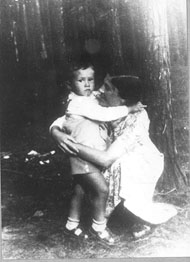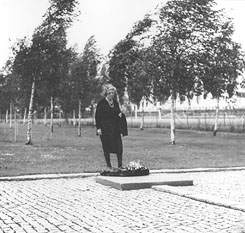

Roman und Eleonora Witoński
*1938/1939 in Radom, Poland
THE 20 CHILDREN
Roman and Eleonora Witoński
Roman (Romek) Witoński was born on 8 June 1938 in Radom, Poland; his sister Eleonora (Lenka) on 16 September 1939. Their father Seweryn Witoński was a pediatrician in Radom. The family had to live in the Radom ghetto. On 21 March 1943, the Jewish holiday Purim, they and some 150 other Jewish men, women and children were brought to the old Jewish cemetery of Szydlowice. The SS began a mass shooting of the men. Seweryn Witoński was murdered in front of his family. His wife Rucza was able to hide behind a gravestone with Roman and Eleonora. When they were found, they were not killed, but brought back to Radom ghetto. At the end of July 1944 they were deported to Auschwitz via Pionki Concentration Camp. Rucza Witonska survived Auschwitz and emigrated to France. She married again and took the name Rose Grumelin. She had another son.
For many years Rose Grumelin searched for her two children. She managed to contact Paulina Trocki through SER (Service d’évacuation et de regroupement d’enfants et de familles juifs, Brussels). Trocki, a doctor, who had also been imprisoned in Auschwitz, accompanied the 20 children from Auschwitz to Neuengamme. However, she was only able to remember the two French children, Georges-André Kohn and Jacqueline Morgenstern.
At the time of their murder in Bullenhuser Damm, Roman Witonski was six years old and his sister Eleonora only five. In 1982 Günther Schwarberg and Barbara Hüsing met Madame Witonska in Paris. When they showed her photographs of the children she recognized her son and, a terrible moment later, also her daughter. Rose Grumelin said:
“After their father was murdered on 21 March 1943 (Purim), my children lived in a condition of continual fear. At that time we were still in the ghetto in Radom and when the Nazis banged on the door, both the children jumped quickly into bed. I covered them up completely and they did not move a muscle, for they knew that the Nazis were always hunting for children.
“Roman and Eleonora were both beautiful, good children. After the death of their father, Roman said to me: ‘Don’t worry Mama; as soon as I am grown up, I will work and you will always have everything you need’.
“I saw my children for the last time in November 1944 in Auschwitz. I was separated from my children and taken to the women’s concentration camp. The children were brought to Block 1, the ‘children’s home’.”
Rose Grumelin died aged 99 in Paris in April 2012.





















